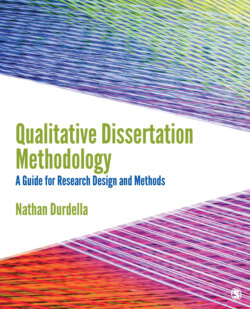Читать книгу Qualitative Dissertation Methodology - Nathan Durdella - Страница 31
На сайте Литреса книга снята с продажи.
Expertise.
ОглавлениеFaculty expertise (Bloomberg & Volpe, 2016; Brause, 2004; Thomas & Brubaker, 2007) is one of the most important criteria that you can use in identifying a potential faculty member to work with as your chair. Prospective chairs may have expertise in the topical or content area and/or methodological expertise—in qualitative research, to be sure. Of course, you need to have a sense of the nature and direction of your proposed study before you can set criteria in expert knowledge or skill in content area or qualitative methodology. What is more, you need to decide which is more important to you, if an eligible faculty member demonstrates a record in content area but not methodology or vice versa. In fact, some faculty may only work with dissertation advisees who agree to use specific research design and methods or empirical and conceptual frameworks—given their own work and their self-perceived proficiency in one or another procedure or theory. For example, you may be open to the use of an ethnographic research tradition and participant observations, where your prospective chair has expertise, so content area knowledge may be more important to you than methodological approach. In some cases, you may find that a faculty member’s research appears to you on multiple levels—topically, conceptually, and methodologically. In all cases, you need to consider where your strengths lie and if you need support in one area more than another.
